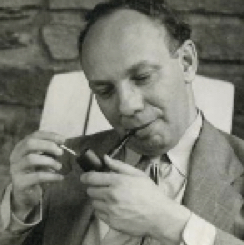Harold Cherniss (1904-1987) was an American Classicist.
A highly renowned academic, Cherniss received his Ph.D. in Greek, Latin, and Sanskrit from the University of California, Berkeley in 1930. However his academic career took an unexpected turn in 1942, when after years of teaching at various elite schools, he enlisted in the army. During the war he served abroad with British Intelligence officers. Returning home from Europe after the war, Cherniss accepted a teaching position at the University of California, Berkeley. It was here that he initially met J. Robert Oppenheimer.
By 1949, controversy had swarmed the University of California. Amidst national paranoia about communist infiltration, the university began requiring employees to perform a loyalty pledge to the United States government. Disgusted, Cherniss resigned from the school and took an appointment at the Institute for Advanced Study, where Oppenheimer was now the Director.
Several years later, Oppenheimer’s job at the Institute was threatened by the revocation of his security clearance. In particular, Lewis Strauss, who was an Institute trustee as well as the Commissioner of the Atomic Energy Commission, wanted to ensure his removal. But Cherniss led an effort among the faculty of the Institute to petition for Oppenheimer to remain as Director. The petition was successful, and Oppenheimer went on to become the Institute’s longest tenured director, a designation he still holds.
The petition declared that: “We, who have known [Dr. Oppenheimer] as a colleague, as director of our own institute, and as a neighbor in a small and intimate community, had from the first complete confidence in his loyalty to the United States, his discretion in guarding its secrets, and his deep concern for its safety, strength, and welfare. Our confidence in his loyalty and patriotic devotion remains unimpaired as our admiration for his magnificent public service is undiminished,” and was signed by many prestigious scientists at the Institute.





